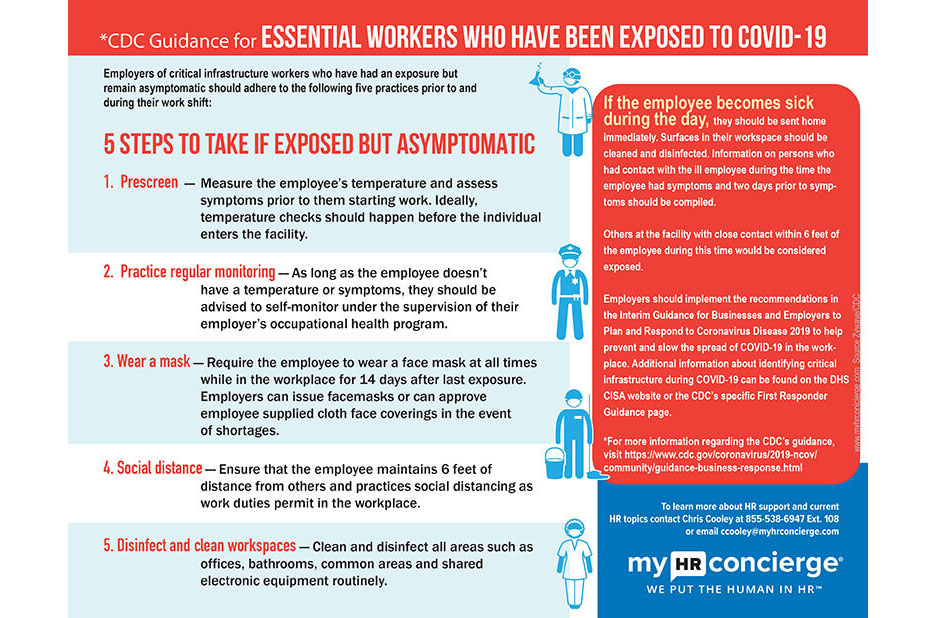HR & Benefits News is a monthly column by Chris Cooley, co-founder of MyHRConcierge and SMB Benefits Advisors.

There was no way to predict the change in the workplace landscape that would take place mid-March of 2020. As a grocer, you not only feel financial threat and health fears but also all kinds of new learning, remote and virtual. There are pros and cons to this. Many businesses are staying afloat while some have been forced to close their doors.
Employers have been forced to adapt and transition into a remote kind of work that has challenged many businesses on every level. But what is coming next? The road back to the next normal will be filled with uncertainty as well as implementation of many laws and regulations that have been issued to deal specifically with the COVID-19 disruption. To better prepare employers, these are some areas of focus for small businesses as you get ready for the next step:
Hiring or re-hiring after the COVID-19 emergency
Words like furlough and layoff have become so common in this time, and paid sick leave and emergency sick leave are part of everyday conversation as well, thanks to the Families First Coronavirus Relief Act (FFCRA). With changes in staffing due to coronavirus, many companies will have to adjust to fill the gaps. For some, this may mean laying off the temporary employees that were hired for the emergency need and for others this looks like hiring or re-hiring staff.
Ensuring the hiring process is a smooth one with applicant tracking and employee onboarding can be essential. A platform such as myHIRE can assist with the applicant tracking, onboarding, as well as mitigate related costs by performing Work Opportunity Tax Credits administration. In addition, screening employees during this time should be done well, and ongoing screening for existing employees is important as well. Many screening companies have limits on their screening services, and a screening company such as myHRScreens can alleviate this concern and ensure that the background check for your employees is thorough.
Things for grocers to consider in hiring or re-hiring after the COVID-19 crisis subsides:
- Stay compliant with federal and state hiring laws—When hiring or re-hiring employees make sure you stay compliant with required federal and state laws associated with new hires. For example, just because you have a Form I-9 on file that does not mean you do not have to get a new one. If the rehire of the employee is within three years of the date of the previous Form I-9 was completed, you may either complete a new Form I-9 or complete Section 3 of the previously completed Form I-9. If the rehire was later than three years of the date of the previous Form I-9, then you should have the employee fill out a new Form I-9;
- Perform Updated Employee Screening—If you currently have an employee screening program, make sure to consistently apply the policy to your new hires and re-hires; and
- Consider HR Assistance—Many businesses have laid off the majority of their workforce. Are you properly staffed in your HR department to efficiently process that significant influx in new hires when businesses reopen? If not, consider working with HR consultants that can help alleviate some of the increased activity during the initial hiring process. Also consider an online onboarding system such as myHIRE to increase the efficiency of the process.
Get to know changes to federal, state labor laws
- Stay Abreast of New Federal and State Laws—As a result of COVID-19, several new laws and changes to existing laws have been made. Examples of these are the Paid Sick Leave Act and the Expansion of Family Medical Leave Act.
- Understand How Unemployment Affects Your Business—In response to the effects of COVID-19, unemployment laws have been expanded and can potentially affect your SUI rates. Depending on your state, layoffs as a result of COVID-19 may or may not count against your SUI rate. Make sure you understand the ramifications of terminations to your SUI rates to reduce their impact.
Workplace safety and training
- Develop Policies for COVID-19 Exposure—It is important to have standard policies that outline how the company will keep employees safe. Examples of these policies include steps to take if employees are exposed to COVID-19, are returning from isolation, social distancing, etc.
- Have Proper PPE and Cleaning—As we return to the workplace, there will still be the risk of COVID-19. Therefore, it is important to have the proper PPE available to keep your employees safe. Examples of these are masks, plexiglass between employees and customers, etc. Also, it is important to have a plan to disinfect the work area each day.
There is no way to predict the various questions or scenarios that are coming our way as we begin this next chapter. However, using a trusted HR expert can help to mitigate any problems that may come from the drastic change in the workforce landscape due to the COVID-19 Pandemic.
For more information regarding Hiring Procedures and help or HR policies during the COVID-19 crisis, COVID-19 support and information or other HR needs, contact MyHRConcierge at 1-855-538-6947 x.108 or email [email protected].



